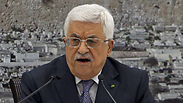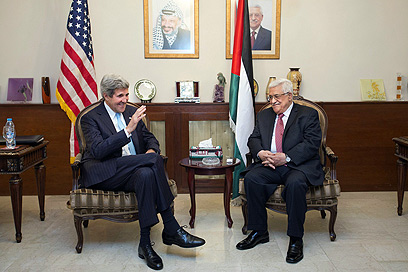
Renewed peace negotiations for no more than nine months followed by a gradual Israeli withdrawal from the West Bank that will take no more than three years – this is the secret diplomatic plan Palestinian Authority President Mahmoud Abbas will put forward, the Palestinian minister for religious affairs claimed.
The claim came as chief Palestinian negotiator Saeb Erekat was set to present plans to US Secretary of State John Kerry on Tuesday, calling for a timetable on ending Israel's occupation of the West Bank and East Jerusalem, Palestinian officials said.
Related stories:
- Erekat: Israel chose apartheid over peace
- Erekat: Occupation is highest form of terrorism
- Erekat: Israel prioritized settlements over peace
Erekat and intelligence chief Majid Faraj will hold a series of meetings with senior officials in Washington in which they will press the case for Palestinian statehood, amid frustration after a year of talks between Israel and the PA collapsed in April.
The discussions with Kerry will focus on establishing "a timeframe for ending Israel's occupation to be agreed as soon as possible and not after the end of this year," said a Palestinian official familiar with the plan Erekat will lay out.
In an interview with Palestinian TV last week, Abbas said it should only take "half an hour or an hour" to delineate the borders of a Palestinian state, since the United States agreed they should be based on the 1967 borders that existed before the war in which Israel captured the West Bank and East Jerusalem.
"There's either a political solution or there isn't," he said. "But going here and there, up and down, talking and not talking - it's been 20 years and nothing has happened."
If there is no agreement on borders in coming months - at least by the end of the year - Abbas said he would have no choice but to push ahead with unilateral statehood moves, a threat he has made before and carried out incrementally.
Offering a possible glimpse at what the Palestinians hope the timetable and talks will include, Mahmoud al-Habash, considered a close Abbas affiliate, said the Palestinian president hopes to discuss the core issues of the conflict, first and foremost the borders of the Palestinian state, which will be at the heart of talks during their first three months.
The remaining six months will be dedicated to the issues of refugees, the status of Jerusalem, settlements, security arrangements and water.
During talks, Abbas will also demand a settlement freeze and the release of the fourth tranche of Palestinian prisoners which Israel promised to but failed release, citing lack of progress in the last round of peace talks which ended uneventfully in April.
Reiterating a claim being heard more and more as of late by Palestinians, Habash also claimed that should Israel drag its feet, the Palestinians will put an international legal process against Israel into motion. Recently, Palestinian officlas have said that should Israel fail to commit to any form of timetable for talks, the Palestinians will petition the UN Security Council and file a suit against Israel at the International Criminal Court in The Hague.
Hanan Ashrawi, a senior member of the Palestine Liberation Organization led by Abbas, told reporters that she was expecting a definite timeline to emerge for the end of Israel's occupation of lands Palestinians want for a state.
"I don't want to give you very specific (timeframe), but let's say within three years we should know that the occupation will end," Ashrawi said at a news conference at the United Nations in New York.
Last week, Nabil Shaath, a senior Fatah official, said that the Palestinian Authority would initially petition the UN Security Council on September 15 to demand a "timetable" for Israel's withdrawal from the West Bank.
Beforehand, on September 4, the Arab League will meet and work to find ways to back the move.
According to Shaath, if the UN request is denied, for example by the US who has veto power in the Council, then the PLO will take the Palestinian case to the International Criminal Court, where it will attempt to try top officials like Prime Minister Netanyahu and Defense Minister Moshe Ya'alon for alleged war crimes in Gaza.
"Taking the case to the ICC is conditional upon the Security Council response to our request," Shaath said, adding that the issue is being discussed within Palestinian political circles.
Reuters contributed to this report
















